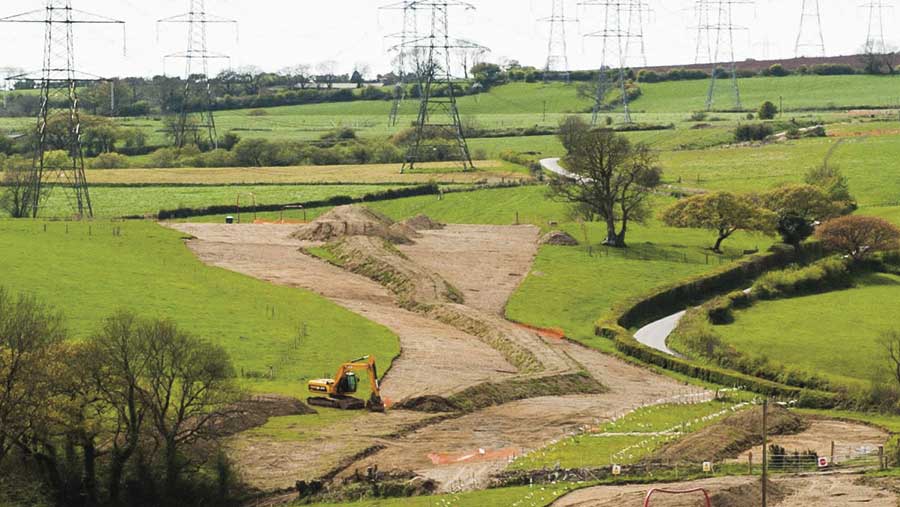Compulsory purchase – understanding who can enter your land
 © Photofusion/Rex/Shutterstock
© Photofusion/Rex/Shutterstock When a big infrastructure or engineering project is planned through the farm, many different people and companies may want to enter your land.
The terms under which they can do so, and what they are entitled to do once they have access, vary widely.
In some cases these people will be from, or will be acting for, a party with compulsory purchase rights, in others it will be a case of negotiating access for cables and pipelines.
Andrew Shirley of the Country Land & Business Association advises on landowners’ rights and how to protect them.
What rights do companies have to enter my land?
Check statutory powers
If a company or organisation contacts you asking to enter your land, you should first of all ascertain whether they have compulsory statutory powers as this will affect what they can do.
Some telecoms and electricity companies may not, and will rely on negotiation, which means your stance will be very different.
Check legislation
You should ask them what powers they are using and then check the legislation to make sure they are using the correct procedure.
Check acquirer
It is also important at the outset to know exactly who the acquirer is. This may seem obvious but a lot of acquirers outsource some of their work.
See also: The farmers fighting compulsory purchase
Access vs acquisition
You also need to know as much detail as possible about the scheme, which section of which piece of legislation they are using to access your land and whether they propose to acquire that land on a temporary or permanent basis, or whether they just want access.
Different powers
They may be seeking access through the section 172 of the Housing and Planning Act 2016, but they could also use existing provisions under the Railway, Electricity, Telecommunications, Water or Town & County Planning Acts – both of which have different requirements.
The Housing and Planning Act, for example, provides for a 14-day notice stating the reason that access is required and compensation for damage. If access is not granted then a warrant can be obtained from a magistrate.
Who will want access to my land?
This all depends on the scheme. They will try to do as much survey work as they can by computer and by using existing datasets as this is often cheaper, but it can be inaccurate.
Initial visit
The first visit you may get is likely to be from a firm establishing or checking the land ownership and occupation details on behalf of the acquiring authority.
Engineers and ecologists
There may also be site visits by engineers and ecologists but they should tell you when, who and for what purpose access is required.
Ecologists are likely to do a number of different surveys on protected species such as newts and bats and habitat loss.
Surveys for bats and birds
Surveys for bats and birds may need to take place at some distance from the scheme and access may be required at night as well as during the day.
As the scheme progresses there may be more visits by engineers and more invasive surveys looking at soil structure or hydrology. You can request a copy of their surveys if it is useful for you.
Trespass
It is important you make sure that only those authorised to do so enter your land for the purposes either in the notice or that you have agreed to.
This ensures you can deal with the unintended consequences of trespass and so you know what they are working on at a given time.
If they have not served you with the appropriate notice, or do not have your consent, you are within your rights to ask them to leave.
Impact
The acquirer will ask the landowner and occupier about the impact of the scheme on their businesses.
It is important that you take appropriate advice on this issue to ensure from the outset that you give an accurate and full description of your business activity and also the impacts of the scheme.
You should request a record of this meeting and of any reports which follow, because you may disagree with their assessment.
What advice should I get?
Chartered surveyor
It is important that you instruct a chartered surveyor with suitable experience both in compulsory purchase and in the type and scale of the project involved.
You need to ask who exactly in the firm will be doing the day-to-day work on your case.
You may wish to ask them about other projects they have been involved in and on which side they have acted.
Fees
You need to understand what fees are recoverable from the acquirer – usually the acquirer will only pay for the fees in relation to the claim for compensation.
There may be other fees but they will not pay for objections to the scheme.
As the scheme progresses and additional issues are uncovered, you might need farm business, ecology, landscape, accountancy, taxation and legal advice as well.
